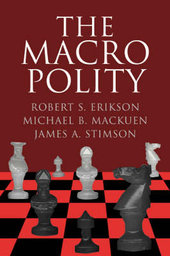
|
The Macro Polity
Paperback / softback
Main Details
| Title |
The Macro Polity
|
| Authors and Contributors |
By (author) Robert S. Erikson
|
|
By (author) Michael B. Mackuen
|
|
By (author) James A. Stimson
|
| Series | Cambridge Studies in Public Opinion and Political Psychology |
|---|
| Physical Properties |
| Format:Paperback / softback | | Pages:496 | | Dimensions(mm): Height 229,Width 152 |
|
| Category/Genre | Macroeconomics |
|---|
| ISBN/Barcode |
9780521564854
|
| Classifications | Dewey:320.01 |
|---|
| Audience | | Tertiary Education (US: College) | |
|---|
| Illustrations |
47 Tables, unspecified; 89 Line drawings, unspecified
|
|
Publishing Details |
| Publisher |
Cambridge University Press
|
| Imprint |
Cambridge University Press
|
| Publication Date |
14 January 2002 |
| Publication Country |
United Kingdom
|
Description
The Macro Polity provides the first comprehensive model of American politics at the system level. Focusing on the interactions between citizen evaluations and preferences, government activity and policy, and how the combined acts of citizens and governments influence one another over time, it integrates understandings of matters such as economic outcomes, presidential approval, partisanship, elections, and government policy-making into a single model. Borrowing from the perspective of macroeconomics, it treats electorates, politicians, and governments as unitary actors, making decisions in response to the behavior of other actors. The macro and longitudinal focus makes it possible to directly connect the behaviors of electorate and government. The surprise of macro-level analysis, emerging anew in every chapter, is that order and rationality dominate explanations. This book argues that the electorates and governments that emerge from these analyses respond to one another in orderly and predictable ways.
Reviews'... the book offers a major intervention in the debate about how best to conceptualize the link between micro and macro political trends.' Journal of Public Policy '... a much more interesting approach than we often tread in other books on political systems. furthermore, its implication that the public mood does matter in politics and that we cannot dispose if it as uninteresting opinions of uninformed nitwits, or even the bellyaching of quarrelsome persons, as we hear too often, gives hope for theories and research into democratic systems.' Acta Politica
|